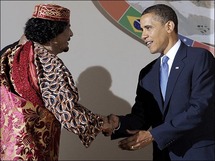More air attacks on Libya as world powers keep up pressure
Imed Lamloum
TRIPOLI, Imed Lamloum- Loud blasts rocked the Libyan capital Tripoli for the 11th night in a row on Tuesday as world powers vowed to press efforts to stop Moamer Kadhafi's "murderous attacks" on civilians but stopped short of proposals to send him into exile.
France is prepared to hold discussions over supplying military aid to Libyan rebels fighting Kadhafi's forces, Foreign Minister Alain Juppe said, while US Secretary of State Hillary Clinton said that although UN sanctions prohibit the delivery of arms to the country, that ban no longer applies.

Two loud explosions rocked the Libyan capital Tripoli on Tuesday evening close to Kadhafi's tightly guarded residence and military targets in the suburb of Tajura were also hit, an AFP correspondent reported.
The first explosion was heard around 1630 GMT, followed by a second some three minutes later in the Bab Al-Azizya district, and ambulance sirens were heard shortly afterwards.
At around the same time, seven other explosions were reported in the suburb of Tajura, site of several military camps and an almost-nightly target of the air raids.
A resident said planes were seen firing five missiles at a military radar installation and another reported seeing flames and a column of smoke from the site.
Italian Foreign Minister Franco Frattini told AFP that participants in the London conference of more than 40 countries and organisations, including the United Nations and NATO, had unanimously agreed that Kadhafi should leave the country.
The final statement from the talks made no mention of any possible exile, but Frattini said: "A consensus has been reached, participants at the meeting unanimously said that Kadhafi must leave the country.
"Beyond that, it depends on the country which may offer to welcome Kadhafi. There is as yet no formal proposal, no country has formulated such a plan, even the African countries which may be ready to make one."
British Foreign Minister William Hague, who chaired the conference, said the delegates "agreed that Kadhafi and his regime have completely lost legitimacy."
US military strikes on Libya have cost $550 million so far, the Pentagon said, adding that the tab was likely to increase another $40 billion in the next few weeks.
Between March 19 and 28, the Defence Department spent more than 60 percent of the funds on munitions, such as missiles and bombs, with the rest going toward deploying troops and covering the costs of combat, including additional fuel needed for US aircraft and ships.
In London, Clinton and British Prime Minister David Cameron said that allied air strikes would go on until the Libyan leader met UN demands for a ceasefire.
The strongman's forces had earlier checked the westward progress of anti-regime rebels towards his hometown of Sirte, an advance which began when Britain, France and the United States started air strikes on March 19.
On Tuesday, the rebels retreated 40 kilometres (25 miles) from their frontline positions to Nofilia, 100 kilometres from Sirte, which is the next big target in their efforts to oust Kadhafi as they head west towards Tripoli.
His forces unleashed barrages of artillery fire, triggering a stampede of rebel fighters, many fleeing aboard their pickup trucks.
The London conference, which included representatives from seven Arab states plus the heads of the United Nations and NATO, was intended to map out a future for Libya following the conflict.
In his opening remarks, Cameron said the air strikes were helping to protect civilians from "murderous attacks" by Kadhafi's forces on civilians in the western rebel-held town of Misrata and said Kadhafi remained in "flagrant breach" of UN demands for a ceasefire.
"Kadhafi is using snipers to shoot them down and let them bleed to death in the street."
Tanks and troops loyal to Kadhafi swept through Misrata on Tuesday, firing shells as they attacked Libya's third city, 214 kilometres (132 miles) east of Tripoli, a rebel spokesman said. He warned of a "massacre" ahead.
A doctor in the city said 142 people had been killed and 1,400 were wounded since March 18. Rebels said a hospital ship was expected to dock Tuesday in Misrata.
Clinton told the conference that military action would continue "until Kadhafi fully complies with the terms of (UN resolution) 1973, ceases his attacks on civilians, pulls his troops back from places they have forcibly entered, and allows key services and humanitarian assistance to reach all Libyans".
But Argentina's President Cristina Kirchner denounced the bombings by a coalition of "so-called civilised" Western nations.
"When you consider that these so-called civilised countries are trying to solve problems by dropping bombs, it makes me proud to be South American," the Argentine leader told reporters during a visit by Venezuelan President Hugo Chavez.
"In economic terms, we've been labelled underdeveloped, second-tier countries," she said.
"But those of us from so-called uncivilised countries have succeeded to resolve our conflicts in a civilised way, through international law."
Participants agreed to set up a contact group to lead the international efforts to map out Libya's future, with the first meeting to take place in Qatar.
Ahead of the talks, Kadhafi issued a defiant letter likening the NATO-led strikes targeting his artillery and ground forces to military campaigns launched by Adolf Hitler during World War II.
"Stop your barbaric, unjust offensive on Libya," he said in the letter.
"Leave Libya for the Libyans. You are committing genocide against a peaceful people and a developing nation," he said.
-------------------------------------------------------------------------------